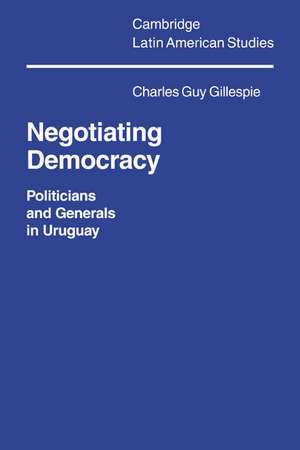Negotiating Democracy: Politicians and Generals in Uruguay: Cambridge Latin American Studies, cartea 72
Autor Charles Guy Gillespieen Limba Engleză Paperback – 19 apr 2006
| Toate formatele și edițiile | Preț | Express |
|---|---|---|
| Paperback (1) | 286.30 lei 43-57 zile | |
| Cambridge University Press – 19 apr 2006 | 286.30 lei 43-57 zile | |
| Hardback (1) | 858.78 lei 43-57 zile | |
| Cambridge University Press – 28 noi 1991 | 858.78 lei 43-57 zile |
Din seria Cambridge Latin American Studies
-
 Preț: 200.79 lei
Preț: 200.79 lei - 9%
 Preț: 593.10 lei
Preț: 593.10 lei -
 Preț: 231.54 lei
Preț: 231.54 lei -
 Preț: 198.38 lei
Preț: 198.38 lei -
 Preț: 236.92 lei
Preț: 236.92 lei -
 Preț: 188.27 lei
Preț: 188.27 lei -
 Preț: 236.99 lei
Preț: 236.99 lei -
 Preț: 322.67 lei
Preț: 322.67 lei -
 Preț: 289.01 lei
Preț: 289.01 lei -
 Preț: 526.45 lei
Preț: 526.45 lei -
 Preț: 209.07 lei
Preț: 209.07 lei - 11%
 Preț: 691.66 lei
Preț: 691.66 lei -
 Preț: 257.52 lei
Preț: 257.52 lei -
 Preț: 290.63 lei
Preț: 290.63 lei -
 Preț: 238.63 lei
Preț: 238.63 lei -
 Preț: 234.31 lei
Preț: 234.31 lei - 9%
 Preț: 594.06 lei
Preț: 594.06 lei -
 Preț: 156.72 lei
Preț: 156.72 lei - 11%
 Preț: 591.79 lei
Preț: 591.79 lei - 14%
 Preț: 732.69 lei
Preț: 732.69 lei -
 Preț: 325.38 lei
Preț: 325.38 lei - 11%
 Preț: 694.91 lei
Preț: 694.91 lei -
 Preț: 328.56 lei
Preț: 328.56 lei -
 Preț: 321.74 lei
Preț: 321.74 lei - 5%
 Preț: 306.74 lei
Preț: 306.74 lei -
 Preț: 287.07 lei
Preț: 287.07 lei -
 Preț: 284.98 lei
Preț: 284.98 lei -
 Preț: 287.66 lei
Preț: 287.66 lei -
 Preț: 284.39 lei
Preț: 284.39 lei -
 Preț: 318.84 lei
Preț: 318.84 lei -
 Preț: 287.28 lei
Preț: 287.28 lei -
 Preț: 191.51 lei
Preț: 191.51 lei -
 Preț: 322.51 lei
Preț: 322.51 lei -
 Preț: 236.72 lei
Preț: 236.72 lei
Preț: 286.30 lei
Nou
Puncte Express: 429
Preț estimativ în valută:
54.80€ • 59.55$ • 46.06£
54.80€ • 59.55$ • 46.06£
Carte tipărită la comandă
Livrare economică 21 aprilie-05 mai
Preluare comenzi: 021 569.72.76
Specificații
ISBN-13: 9780521025638
ISBN-10: 052102563X
Pagini: 284
Dimensiuni: 156 x 228 x 16 mm
Greutate: 0.42 kg
Ediția:Revised
Editura: Cambridge University Press
Colecția Cambridge University Press
Seria Cambridge Latin American Studies
Locul publicării:New York, United States
ISBN-10: 052102563X
Pagini: 284
Dimensiuni: 156 x 228 x 16 mm
Greutate: 0.42 kg
Ediția:Revised
Editura: Cambridge University Press
Colecția Cambridge University Press
Seria Cambridge Latin American Studies
Locul publicării:New York, United States
Cuprins
Foreword Juan Linz; Acknowledgments; 1. Introduction: political parties, theories of regime change, and the Uruguayan case; Part I. The Crisis and Survival of Uruguayan Political Parties: 2. Politicians and parties in Uruguay: origins and crisis; 3. The breakdown of democracy; 4. The failure of military institutionalization and political engineering: the survival of political parties; Part II. From Authoritarian Crisis To Transition: 5. Attempts at party renewal: from above and below; 6. Party and military strategies in the 'dialogue': from partial opening to confrontation after the Parque Hotel talks; 7. From mobilization to negotiation: the exhaustion of alternatives; 8. The Naval Club pact: party and military strategies in the transition; Part III. Political Parties and Democratic Consolidation: 9. The competition for support: leadership strategies and electoral behaviour before and after the 1984 electrons; 10. The legacies of authoritarianism and the challenges for democracy; Conclusion; Appendix; Bibliography; Index.
Descriere
This book discusses how Uruguay was once the most stable democracy in Latin America, but in 1973 the military seized power for the first time.









